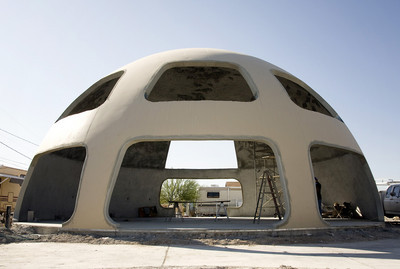Domestic appeal

Su-Z and Dave Allen’s new home is literally a phoenix rising from the ashes.
Except that their new home — aptly named Fenix dome — won’t follow the mythical bird’s life cycle of being reborn out of the ashes over and over.
The Allens are building a monolithic dome home made out of concrete reinforced with steel.
"We’re building it (a dome home) because it’s energy efficient, earthquake proof — we live between two faults — hurricane proof, tornado proof, termite proof and, number one, fireproof," Su-Z Allen said.
Although the Allens’ home is still under construction, it is one of about 20 in 15 states being featured Sunday during a national tour of dome homes. John and Diane Kerst of Bunkersville, Nev., also have signed up to participate.
Located near the corner of Carey Avenue and Lamb Boulevard in North Las Vegas, Allen said she expects her new home to become a landmark.
When completed, the dome home will have about 3,800 square feet of space, including a 1,500-square-foot master suite that will occupy the entire second floor. It is 50 feet in diameter and 25 feet high at the peak.
Ray Ansel, owner of R & S Life Line Domes LLC, which is building the Allens’ home, said dome homes are gaining in popularity because of their durability and energy efficiency.
"We guarantee a 30-70 percent savings in cooling and heating costs," he said.
The savings result from the construction method used to create the domes, as well as their shape, which naturally distributes warm or cool air throughout the structure.
According to Ansel, monolithic domes are made by inflating an air form. Once inflated, 3-4 inches of polyurethane foam is sprayed on the form’s interior, creating one solid piece of insulation so there is no heat transfer through the walls. A rebar frame is then made, which is held in place by the foam and the air pressure inside the form. The final interior layer is shotcrete.
"It’s like an upside down swimming pool," Ansel said.
The exterior is generally covered with a spray-on material called sharkskin, that is similar to bed liners for pickup trucks.
The energy savings are realized by the combination of foam and concrete, which acts as a passive solar heat sink. It will store heat or coolness and then slowly radiate it back into the home.
In addition, the homes are virtually immune to natural disasters, as well as to damage by termites.
"They can last for 1,000 years because there’s no wood on the exterior that will deteriorate or get termites and concrete gets stronger and stronger as the years go by," said Ansel, who has built more than 200 domes across the nation since 1989.
The cost to build the dome home is comparable to a custom, stick-built home. "And if we do some of the work ourselves, it will cost even less," Allen said.
Ansel said dome homes generally cost between $125-$130 per square foot but that can vary depending on the price of concrete and types of materials selected for cabinetry, countertops and flooring.
The Allens, who are long-distance truck drivers, said they first became acquainted with dome homes while driving on Interstate 35 through Italy, Texas, where the developer of the monolithic dome is headquartered. Several dome homes and offices dot the perimeter of the highway.
"I called it an onion house. Ever since I saw them, I wanted one," Allen said, adding that it was just sheer coincidence that she spoke with a representative from the Monolithic Dome Institute the morning their house burnt down. That was June 18, 2005.
Most of the past three years have been spent creating blueprints for the home and getting the proper permits from the county. Allen said it took them about six months to get through the permit process, but now that she has done that she would be happy to help anyone else interested in building a dome home.
The past few months have seen the most progress, starting May 1 when work began on the foundation and dome’s base. Once the foundation was in place, the air form was blown up Aug. 27 and shotcrete work began Sept. 28.
Now that the basic form is done, Allen said windows should follow shortly, as should framing for interior walls. She hopes some of the walls will be in place in time for Sunday’s tour.
Allen said she is not sure how long it will take for them to complete their house because of financial considerations. The current economy has made it near impossible to get financing, she said.
Until then, she has converted a workshop in the back of the property into a makeshift residence so she can properly care for her menagerie of chickens, ducks, dogs and a turkey.
More information about the Allens’ home can be found at www.fenixdome@iwarp.com. For more information about dome homes, visit www.lifelinedomes.com or static.monolithic.com.